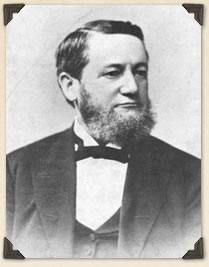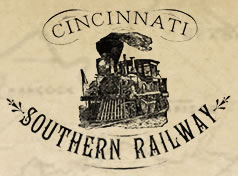
Edward A. Ferguson is considered the father of the Cincinnati Southern Railroad. Born in New York November 6, 1826, Ferguson moved to Cincinnati with his family in 1830. He was educated in the public school system at Talbot’s Academy and then went on to Woodward College. Having received his legal education at home, Ferguson became a member of the Cincinnati Bar Association in May 1848.
Before Ferguson entered the practice of law, he spent almost two years as a Cincinnati public school teacher. At just 26, Ferguson was elected City Solicitor and was exposed to his first taste of the legislative process. After his term as solicitor expired, Ferguson was hired by the Hamilton County Commissioners to serve as their legal advisor.
In 1859, Ferguson was elected one of the three Senators from Hamilton County. While in Columbus, Ferguson served with James A. Garfield, who went on to become the 20th president of the United States. Though Ferguson’s senate term ended in 1861, it would be eight years before he would write the legislation that would make history.
Though the idea of building a railroad to the South through Cincinnati had been discussed since the early 1830s, the Ohio Constitution of 1851 prohibited counties, cities and towns from becoming owners in any joint stock company, thereby hampering Cincinnati’s ability to construct its railway. It wasn’t until Ferguson’s "remarkable proposition" was put forward that the Queen City found a way to build its railroad.
Ferguson’s idea, while remarkable, was very simple in nature – there was nothing in the Ohio Constitution that prevented the city itself from building and owning a railroad – and he quickly drew up the Cincinnati Southern Railway Act. Officially titled "An Act Relating to Cities of the First Class Having a Population Exceeding 150,000 Inhabitants," the legislation was made law May 4, 1869.
At the banquet celebrating the railroad’s completion held at Music Hall on March 18, 1880, Ferguson delivered a speech that touched on a new motivation for his railroad to the South "Although it has been built to serve the purposes of trade, it will have a higher and nobler use," Ferguson said. "Those who have been strangers will become neighbors. New ties, not of interest alone, but of affection, will be created, and sectional antipathy will give place to a feeling of love for a common country and the institutions founded by an illustrious ancestry." He closed his speech, "Inspired by these thoughts, I believe I give voice to the sentiment of your hosts tonight when I say to you, their guests, ‘You have come home.’"

